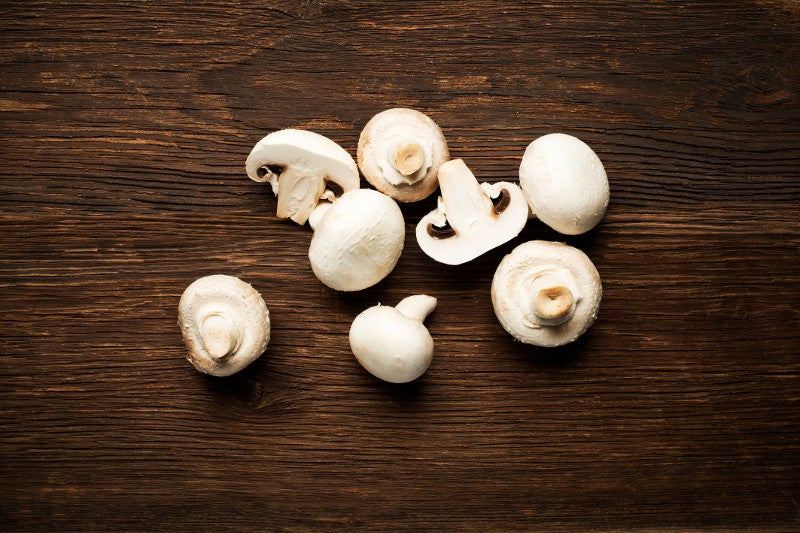May 2019 Hot Topic: Can Diet Cut Mild Cognitive Impairment Risk in Half?

Mild cognitive impairment (MCI) is common, and it often requires increased caretaking and results in lower overall health. It is also a frequent harbinger of impending dementia. New research suggests that simple dietary changes may cut MCI risks dramatically.
For instance, a new study found that seniors who ate more than two standard servings of mushrooms (approximately ¾ of a cup of cooked mushrooms is a serving) per week had a more than fifty percent reduced risk of MCI compared to seniors who ate less than one serving per week.1 Researchers tracked Chinese seniors living in Singapore over a period of six years, and common mushroom types were included: golden, oyster, shiitake, and white button mushrooms. Dried and canned were included along with fresh.1 A study of Japanese seniors found similar decreased risk of cognitive impairment with increased mushroom consumption.2
Ergothioneine’s Role
What about mushrooms has this neuroprotective effect? Although there are many beneficial compounds in mushrooms, the researchers highlight the role of the amino acid ergothioneine, which is an antioxidant and reduces inflammation.1 Humans cannot synthesize ergothioneine and obtain it only through diet. Ergothioneine can also be synthesized by cyanobacteria and mycobacteria, and is present in most cells in both plants and mammals.3 It may help to protect against neurotoxicity, although more research is needed to determine if that is indeed the case.3 Ergothioneine levels decline with age, and also significantly decline during the early stages of dementia.4
Although mushrooms are one of the largest sources of ergothioneine in the diet, some nuts, such as Brazil, gingko, pistachio, almond, and macadamia, also have substantial amounts.5 Some spices, including basil, cumin, pepper, and ginseng, are also known to have some, as do some strains of asparagus. In addition, tempeh has one of the highest known levels of ergothioneine.5
This range of sources may help to explain why components of a healthy diet have been found to decrease MCI risks in a range of studies. For instance, one study of Chinese patients older than 55 years found that consuming more than 10 grams a day of nuts was correlated with a 40% decrease in likelihood of poor cognitive function (after adjustment for other factors).6 Ten grams of nuts is not a large quantity; depending on the nut, it is equivalent to a small handful of nuts, or 6-10 individual nuts. The six-year longitudinal Nurses’ Health Study also found that five servings of nuts a week led to significantly improved cognition.7
One double-blind, placebo-controlled trial found that Yamabushitake mushroom powder given to elderly Chinese seniors with mild cognitive impairment resulted in an improvement in cognitive scores over sixteen weeks—although scores only improved as long as participants consumed the mushroom supplement, declining quickly after it was stopped.8 This could be because ergothioneine levels were not maintained.
Nutrition Considerations
The effect of nutrition on cognitive function during aging has attracted quite a bit of interest, and a higher adherence to healthy dietary patterns does seem to be neuroprotective.9 Some diets, including the Mediterranean diet, may not only be protective against and slow the progression of MCI and Alzheimer’s, but also against all-cause mortality in patients with these conditions.10 However, a number of diets have shown positive effects on cognitive health outcomes, primarily diets with high intake of plants and poly- and monounsaturated fats.11,12
Research does suggest that the longer the healthy eating pattern persists, the greater the impact on cognitive function.13
As research continues to unravel the compounds and dietary patterns that can slow and prevent cognitive decline, many more treatment opportunities will likely arise. Since nutrition affects the structure and function of both the brain and body, recommending healthy eating patterns may be one of the most impactful interventions for long-term health.
References
- Feng L, Cheah IK, Ng MM, et al. The association between mushroom consumption and mild cognitive impairment: a community-based cross-sectional study in Singapore. J Alzheimers Dis. 2019;68(1):197-203. doi:10.3233/JAD-180959
- Zhang S, Tomata Y, Sugiyama K, Sugawara Y, Tsuji I. Mushroom consumption and incident dementia in elderly Japanese: the Ohsaki Cohort 2006 study. J Am Geriatr Soc. 2017;65(7):1462-1469. doi:10.1111/jgs.14812
- Cheah IK, Halliwell B. Ergothioneine; antioxidant potential, physiological function and role in disease. Biochim Biophys Acta. 2012;1822(5):784-793. doi:10.1016/j.bbadis.2011.09.017
- Cheah IK, Feng L, Tang RMY, Lim KHC, Halliwell B. Ergothioneine levels in an elderly population decrease with age and incidence of cognitive decline; a risk factor for neurodegeneration? Biochem Biophys Res Commun. 2016;478(1):162-167. doi:10.1016/j.bbrc.2016.07.074
- Halliwell B, Cheah IK, Tang RMY. Ergothioneine – a diet-derived antioxidant with therapeutic potential. FEBS Lett. 2018;592(20):3357-3366. doi:10.1002/1873-3468.13123
- Li M, Shi Z. A prospective association of nut consumption with cognitive function in Chinese adults aged 55+ _ China Health and Nutrition survey. J Nutr Health Aging. 2019;23(2):211-216. doi:10.1007/s12603-018-1122-5
- O’Brien J, Okereke O, Devore E, Rosner B, Breteler M, Grodstein F. Long-term intake of nuts in relation to cognitive function in older women. J Nutr Health Aging. 2014;18(5):496-502. doi:10.1007/s12603-014-0014-6
- Mori K, Inatomi S, Ouchi K, Azumi Y, Tuchida T. Improving effects of the mushroom Yamabushitake (Hericium erinaceus) on mild cognitive impairment: a double-blind placebo-controlled clinical trial. Phytother Res. 2009;23(3):367-372. doi:10.1002/ptr.2634
- Gardener SL, Rainey-Smith SR. The role of nutrition in cognitive function and brain ageing in the elderly. Curr Nutr Rep. 2018;7(3):139-149. doi:10.1007/s13668-018-0229-y
- Solfrizzi V, Panza F, Frisardi V, et al. Diet and Alzheimer’s disease risk factors or prevention: the current evidence. Expert Rev Neurother. 2011;11(5):677-708. doi:10.1586/ern.11.56
- Chen X, Maguire B, Brodaty H, O’Leary F. Dietary patterns and cognitive health in older adults: a systematic review. J Alzheimers Dis. 2019;67(2):583-619. doi:10.3233/JAD-180468
- Smith PJ, Blumenthal JA. Dietary factors and cognitive decline. J Prev Alzheimers Dis. 2016;3(1):53-64. doi:10.14283/jpad.2015.71
- Yuan C, Fondell E, Bhushan A, et al. Long-term intake of vegetables and fruits and subjective cognitive function in US men. Neurology. 2019;92(1):e63-e75. doi:10.1212/WNL.000000000000668
